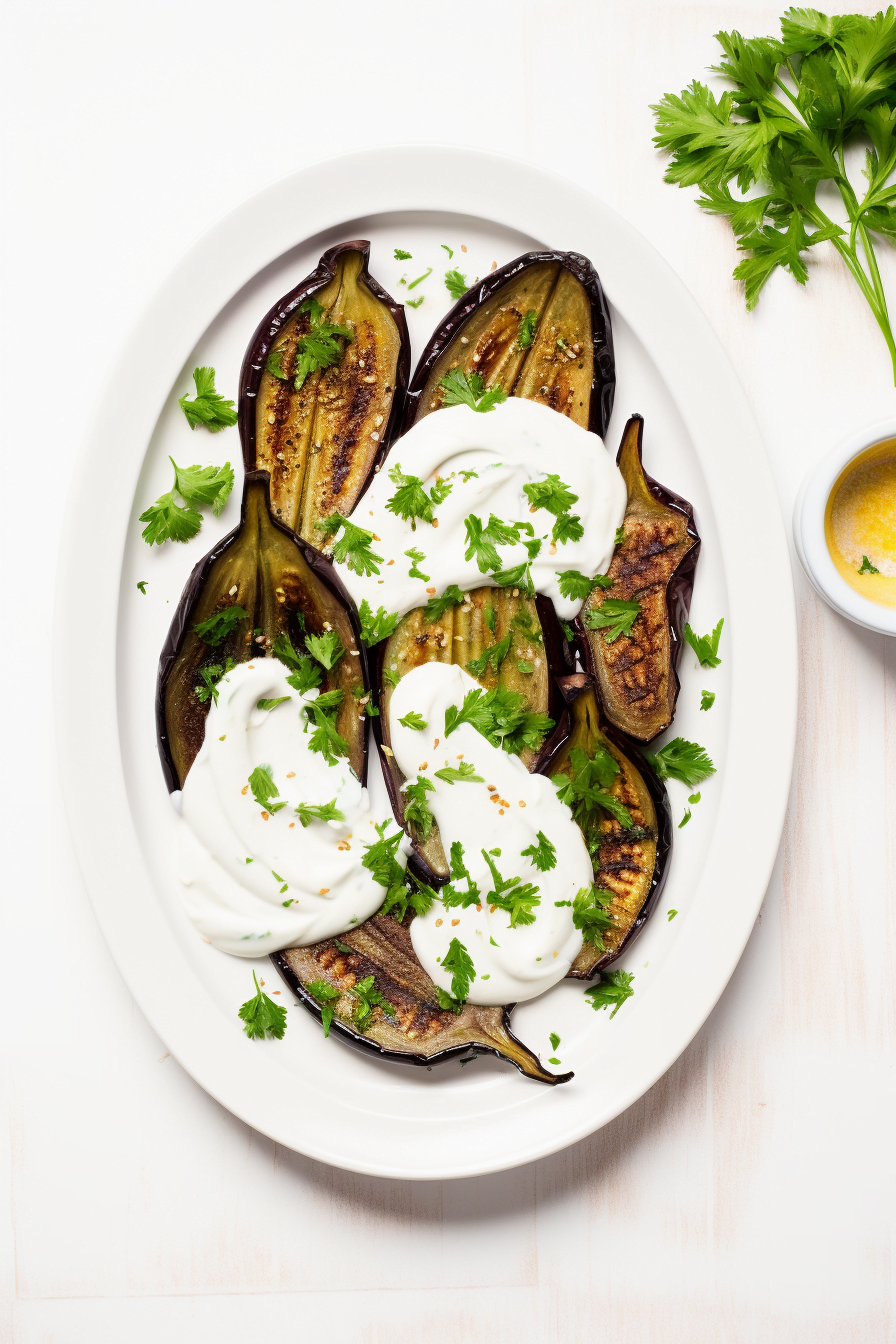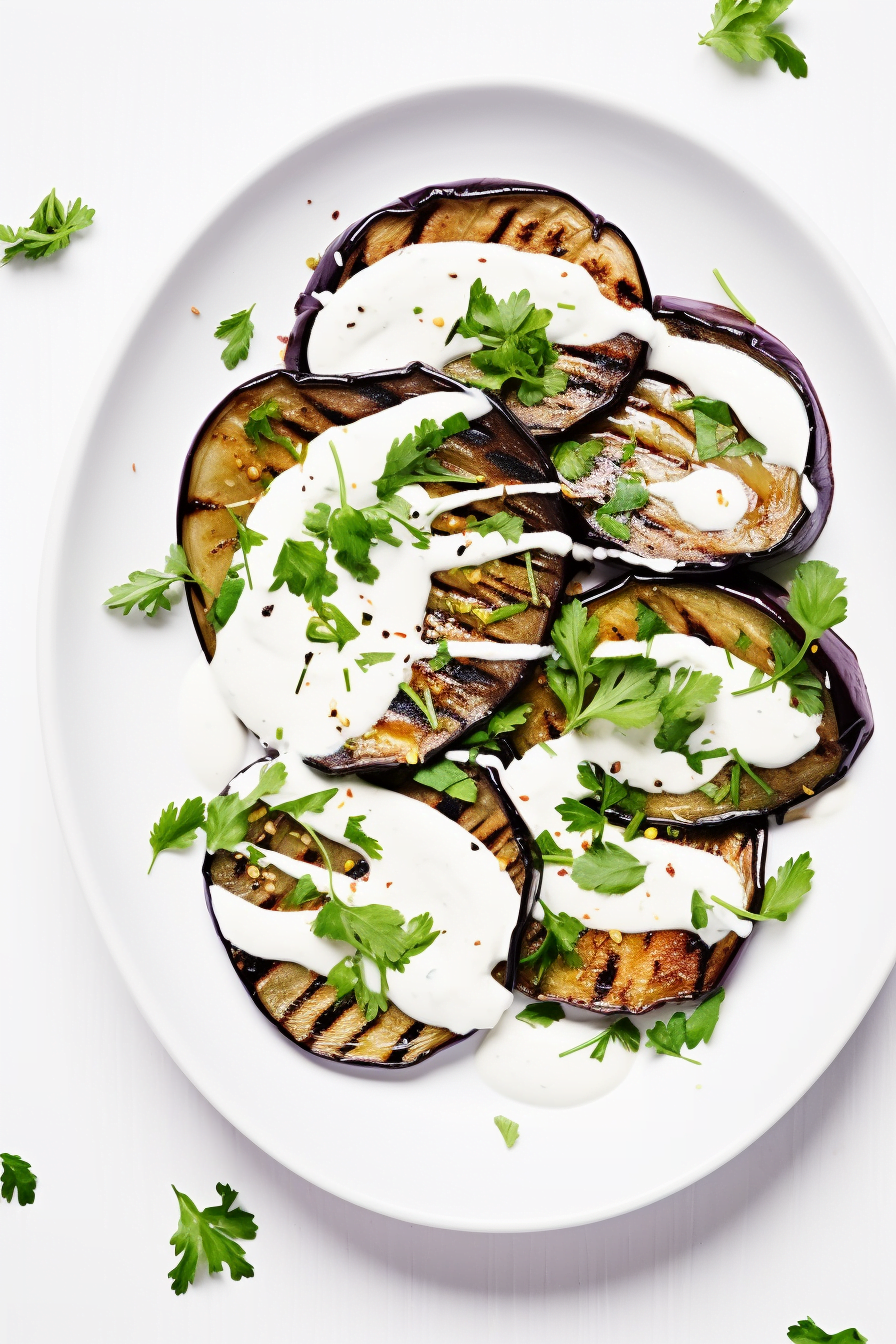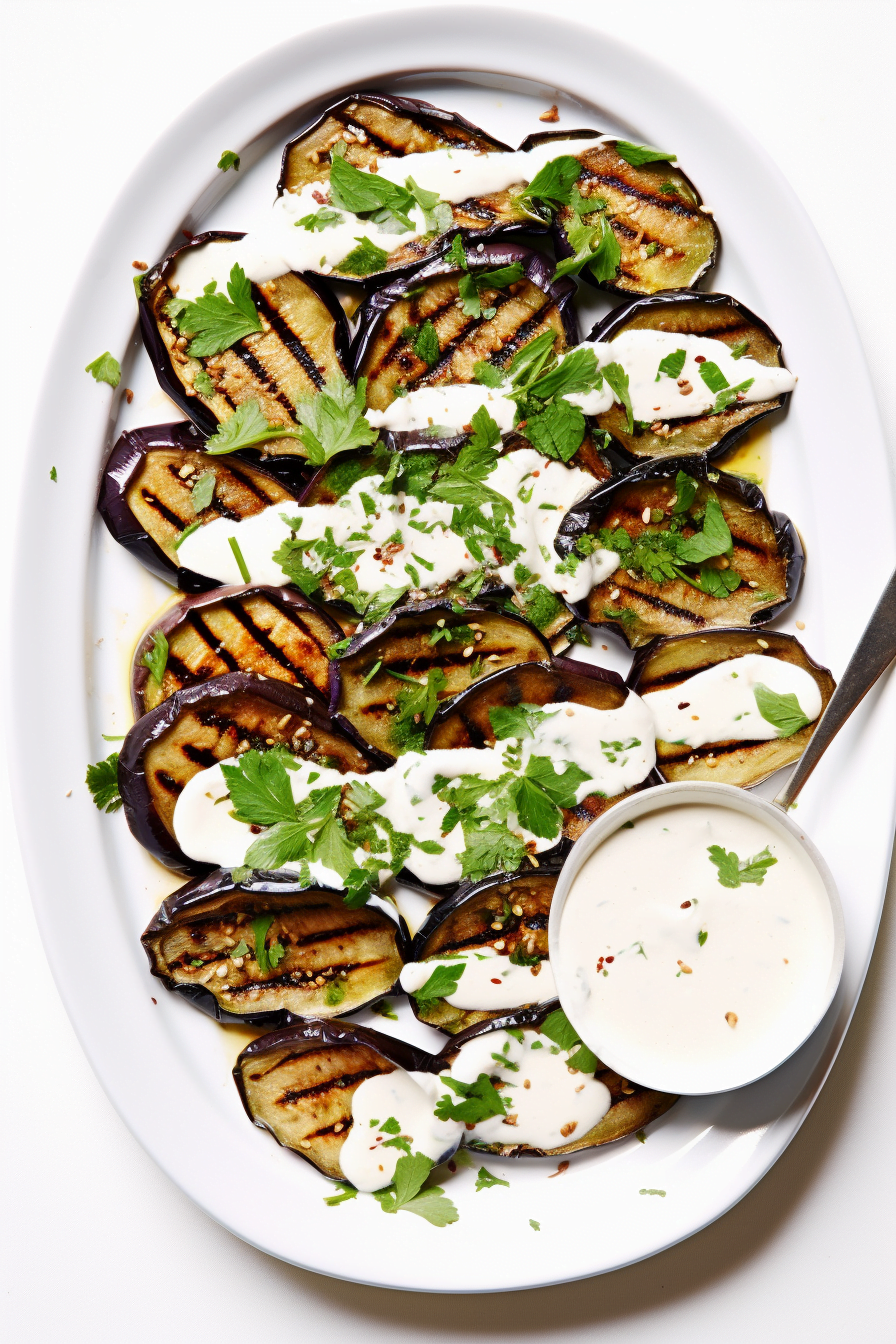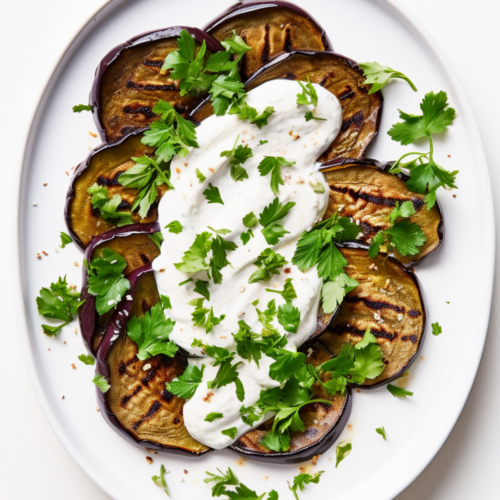Embark on a Culinary Journey with Egyptian Roasted Eggplant with Garlic and Herbs (Salata Zabadi)
Imagine a dish that captures the essence of the Mediterranean, a recipe that is as nourishing as it is flavorful. Today, we’re diving into the world of Egyptian cuisine with a classic dish known as Egyptian Roasted Eggplant with Garlic and Herbs, or Salata Zabadi. This dish is a celebration of simple ingredients coming together to create a symphony of tastes that will transport your palate to the bustling streets of Cairo.
Whether you’re a seasoned chef or a curious foodie, this recipe is designed to guide you through the process of creating a truly authentic Mediterranean experience. The smoky roasted eggplant, combined with the zesty garlic and fresh herbs, all brought together by the creaminess of Greek yogurt, makes for a perfect side dish or mezze that is sure to impress.

The Story Behind Salata Zabadi
The roots of Salata Zabadi stretch deep into the heart of Egyptian culture, where the eggplant is not just a vegetable but a staple ingredient that has been savored for centuries. This dish is a testament to the versatility of the eggplant, showcasing its ability to absorb flavors and transform into a dish that is both comforting and exotic.
Salata Zabadi is a beloved recipe that has been passed down through generations, each family adding their own touch to this timeless classic. It’s a dish that reflects the warm, communal spirit of Egyptian dining, where food is more than sustenance—it’s a reason to gather and share in life’s joys.
Inspired by the bustling markets of Cairo, where vendors proudly display their fresh produce, this recipe incorporates the vibrant herbs and spices that are the lifeblood of Mediterranean cooking. The use of garlic and fresh herbs like parsley and mint is characteristic of the region’s cuisine, which often marries bold flavors with the freshness of local ingredients.
The traditional technique of roasting the eggplant over an open flame infuses the dish with a distinctive smoky flavor that is quintessentially Egyptian. It’s a method that has been honed over centuries, a culinary art form that speaks to the soul of Mediterranean cooking.
With every bite of Salata Zabadi, you’re not just enjoying a delicious meal—you’re partaking in a rich cultural heritage that is as flavorful as the lands from which it hails.

Mastering the Method
Creating the perfect Salata Zabadi is about understanding the subtle nuances that turn simple ingredients into a culinary masterpiece. Here are some detailed steps and chef’s tips to elevate your dish:
Roasting the Eggplant: The key to unlocking the eggplant’s full potential is in the roasting. Make sure your oven is properly preheated to ensure even cooking. When slicing the eggplant, aim for uniform thickness to avoid uneven roasting. Brushing each slice with olive oil not only prevents sticking but also helps achieve that desirable golden-brown crust.
Yogurt Sauce Perfection: The yogurt sauce is the heart of Salata Zabadi. Use Greek yogurt for its thickness and tanginess. Whisking in the tahini adds a nutty depth, while the lemon juice provides a bright acidity that cuts through the creaminess. Finely mince your garlic for a smooth texture and an even distribution of flavor.
Herb Harmony: Fresh herbs are non-negotiable in this dish. They bring a burst of color and freshness that can’t be replicated with dried alternatives. Chop the parsley and mint just before adding them to the sauce to preserve their essential oils and vibrant flavor.
Remember, the magic of this dish lies in the balance of flavors and textures. Take your time with each step, and don’t be afraid to taste as you go. Adjust the seasoning to your preference, and let your palate guide you to the perfect Salata Zabadi.

Variations to Explore
Grilled Eggplant Salata Zabadi
For a more intense smoky flavor, consider grilling the eggplant instead of roasting it. The charred edges will add a rustic touch, reminiscent of traditional Egyptian street food.
Spicy Salata Zabadi
Introduce a little heat by adding a sprinkle of cumin and a dash of cayenne pepper to the yogurt sauce. This will give the dish a warm, spicy undertone that complements the coolness of the herbs.
Deconstructed Salata Zabadi
Transform the dish into an interactive experience by serving the roasted eggplant, yogurt sauce, and herbs separately. This allows guests to build their own bites, customizing the flavor balance to their liking.
Substitutions for Every Palate
Whether you’re accommodating dietary restrictions or simply experimenting with new flavors, there are several substitutions that can be made in this recipe without sacrificing the integrity of the dish.
Dairy-Free Yogurt: To cater to vegan or lactose-intolerant guests, replace the Greek yogurt with a plant-based alternative. Look for a non-dairy yogurt with a thick consistency to mimic the texture of the traditional sauce.
Alternative Herbs: While parsley and mint are classic choices, feel free to incorporate other fresh herbs like cilantro or dill for a different herbaceous note.
Tahini Alternatives: If tahini isn’t to your taste or you’re dealing with a sesame allergy, consider using a nut butter like almond or cashew butter for a similar creaminess and depth of flavor.
Frequently Asked Questions
Can I make Salata Zabadi ahead of time?
Yes, you can roast the eggplant and prepare the yogurt sauce in advance. However, for the best texture and flavor, combine them just before serving.
How do I store leftovers?
Store the roasted eggplant and yogurt sauce separately in airtight containers in the refrigerator for up to 3 days.
Is Salata Zabadi gluten-free?
Yes, this dish is naturally gluten-free, making it suitable for those with gluten sensitivities.
Can I use regular yogurt instead of Greek yogurt?
While Greek yogurt is preferred for its thickness, regular yogurt can be used if strained to remove excess liquid.
What can I serve with Salata Zabadi?
This dish pairs beautifully with grilled meats, fish, or as part of a mezze spread with other Mediterranean appetizers.

Egyptian Roasted Eggplant with Garlic and Herbs (Salata Zabadi)
Equipment
- Oven
- Baking sheet
- Parchment paper
- Brush
- Medium bowl
- Whisk
- Serving platter
Ingredients
- 2 large eggplants about 1 lb or 450g each
- 3 tbsp olive oil 45ml
- 4 cloves garlic minced
- 1 cup plain Greek yogurt 245g
- 2 tbsp tahini 30ml
- Juice of 1 lemon
- 1/4 cup fresh parsley chopped, 15g
- 1/4 cup fresh mint chopped, 15g
- Salt and pepper to taste
- 1 tbsp extra virgin olive oil for drizzling, 15ml
Instructions
- Preheat your oven to 400°F (200°C). Line a baking sheet with parchment paper.
- Wash the eggplants and pat them dry. Slice the eggplants into 1/2-inch (1.25 cm) thick rounds and arrange them on the prepared baking sheet.
- Brush each eggplant slice with olive oil and season with salt and pepper. Roast in the preheated oven for 25 minutes, or until the eggplant is tender and golden brown.
- While the eggplant is roasting, prepare the yogurt sauce. In a medium bowl, whisk together the minced garlic, Greek yogurt, tahini, and lemon juice until well combined. Stir in the chopped parsley and mint, then season with salt and pepper to taste.
- Once the eggplant is done, allow it to cool for a few minutes. Arrange the eggplant on a serving platter and spread the yogurt sauce over the top or serve it on the side.
- Drizzle with extra virgin olive oil and garnish with additional herbs if desired. Serve warm or at room temperature.
Notes

